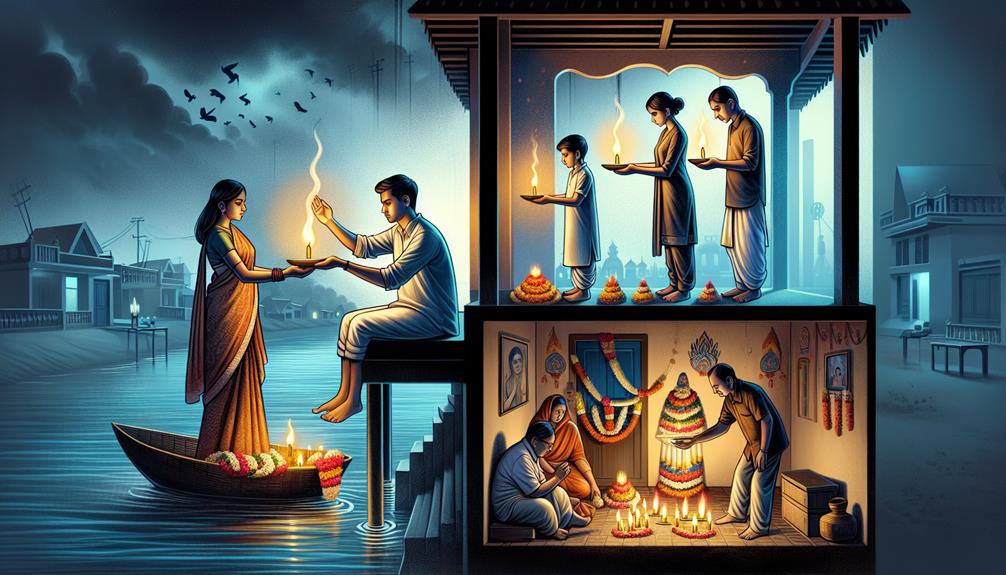When someone we love passes away, it can be really hard.
In Hindu tradition, there are things we should do and things we shouldn’t do for the first year after someone dies. These traditions help the soul of the person who passed away and also help us find comfort.
It’s important to understand why we do these things and how they can help us heal. By following these traditions with care and respect, we can honor our loved ones and learn more about the connection between life, death, and the spiritual journey.
Dos After Death in a Hindu Family for 1 Year

After the loss of a loved one in a Hindu family, it’s crucial you engage in specific rituals and practices for a year to honor their memory.
You’ll need to participate in daily prayers, observe dietary restrictions, and attend spiritual gatherings to find solace.
Additionally, offering support to those grieving and maintaining regular contact with spiritual leaders can provide both emotional and spiritual comfort during this time.
Performing Rituals Regularly
Engaging in daily prayers and rituals is an important way to honor your loved one who’s passed away. The Shradh ceremony, especially on their death anniversary, holds significant meaning in remembering and paying respect to the departed soul. These rituals provide comfort and help connect the physical and spiritual realms.
It’s important to participate in the Shradh ceremony at specific intervals to ensure the peace and fulfillment of the departed soul. These rituals aren’t only for the deceased but also for you and your family to find comfort and move forward while keeping the memory of your loved one alive.
Respecting Traditions
Observing fasts on special days and during important religious events is an important tradition for a Hindu family in mourning. It’s a way to show respect and remember the departed soul.
Attending religious discourses, satsangs, and spiritual gatherings can provide comfort and healing. These practices aren’t just rituals; they’re paths to inner peace and a way to honor the life that was.
Engage in these traditions sincerely as they offer a connection to the divine and remind us of the cycle of life and death.
Embrace these moments of reflection and allow them to guide you through your grief, bringing you closer to understanding and acceptance.
Supporting the Bereaved
Supporting a grieving family means comforting them and helping with daily tasks to make things easier for them. It’s important to listen, be there for them, and acknowledge their pain without trying to fix it right away.
Small acts of kindness like running errands, cooking meals, or helping around the house can make a big difference.
Keep checking in on them regularly, even as time passes, so they know they’re not alone. Your presence and help can really help them as they heal.
Maintaining Regular Contact with Spiritual Leaders
After helping the grieving family, it’s important to talk to spiritual leaders for guidance on mourning rituals and ways to cope during the year-long observance. Keeping in touch with priests or spiritual leaders can help you understand these rituals better and provide comfort and support. Here’s a simple guide to make this process more meaningful:
| Action | Benefit |
|---|---|
| Talk to spiritual leaders | Understand mourning rituals deeply |
| Attend spiritual talks | Learn coping strategies and find comfort |
| Follow advised rituals | Honor the departed and help the grieving process |
| Share what you learn with family | Bring the family together for healing |
| Reflect on teachings | Grow personally and spiritually |
Take this time to grow spiritually and support each other through this journey.
Observing Dietary Restrictions
During the mourning period, it’s important to follow dietary restrictions by avoiding meat and sticking to simple vegetarian meals. This shows respect for the departed and symbolizes a time of self-reflection and purity.
Remember these three things:
- Stick to Vegetarian Food: Only eat vegetarian meals to keep your diet pure and simple.
- Keep Your Meals Simple: Choose basic dishes without any fancy or elaborate cooking.
- Stay Hydrated and Choose Nutritious Ingredients: Drink plenty of water and focus on using fresh fruits and vegetables known for their purity and nutrition.
Embracing Simplicity
It’s important to follow dietary restrictions to honor the departed, and it’s also crucial to simplify your daily activities to show respect and facilitate a period of mourning.
Avoid engaging in activities involving music, dance, or entertainment, and instead focus on creating a calm and peaceful environment at home. This not only honors your loved one’s memory but also supports the emotional well-being of the entire family during this sensitive time.
| Do’s | Don’ts | Why |
|---|---|---|
| Keep gatherings quiet and respectful. | Avoid loud music and parties. | Preserves a peaceful atmosphere. |
| Engage in reflective activities. | Steer clear of extravagant entertainment. | Focuses on introspection. |
| Maintain a simple lifestyle. | Refrain from lavish spending. | Honors the departed’s spirit. |
Connecting with Community
In the year after losing a loved one, it’s important to find a balance between being alone and getting support from your community. Share your feelings and experiences with close friends and family. It’s not just about grieving by yourself; it’s also about feeling the love and understanding of those who care about you.
Here’s how you can manage this delicate balance:
- Choose Quality Time: Spend time with people who truly understand and respect your grief journey.
- Create Safe Spaces: Arrange small get-togethers or one-on-one meetups where you feel comfortable talking about your emotions.
- Accept Help: Don’t be afraid to accept help or companionship when it’s offered. This is a time to rely on the relationships you’ve built.
Encouraging Self-Reflection
Take some time to think about your life and the memories you have with the person who passed away. This year of mourning is a chance for you to grow personally and spiritually.
Take the opportunity to really think about your thoughts and feelings, and to understand that life is temporary and relationships are important.
Use this time to think about your choices and where you want your life to go. Embrace this chance to grow spiritually and to better understand your purpose and values.
Spending time alone can help you process your grief and find inner peace and strength to move forward.
This self-reflection can be life-changing, helping you become more self-aware and satisfied with your life.
Balancing Mourning and Daily Life
Finding a balance between honoring mourning traditions and getting back to daily life is important after losing a loved one in a Hindu family.
Take your time and remember that healing happens at different speeds for everyone. Here are some tips to help you find that balance:
- Make time for reflection and remembrance, while also slowly getting back into your regular routine.
- Ease back into your normal activities gradually, starting with the ones that feel less overwhelming or are necessary for your daily life.
- Lean on your friends and family for support as you transition back to your regular routine. They can offer comfort and help you move forward while still honoring your grief.
Seeking Professional Help if Needed
If you’re having a tough time dealing with the year-long mourning period after losing a loved one in a Hindu family, getting professional help can be really important. It’s not just about getting through the sadness, but also about taking care of your mental health.
| Benefits | Considerations |
|---|---|
| Get emotional support | Find professionals who understand your culture |
| Learn coping strategies | Make sure they have experience with grief |
| Feel a sense of community | Look into group therapy options |
| Get help with depression or anxiety | Find specialists in dealing with loss |
| Get guidance on returning to daily life | Make sure they respect your cultural practices |
Don’ts after death in a Hindu family for 1 year

Following the death of a loved one in a Hindu family, there are specific traditions you’re expected to observe for a year.
You should steer clear of celebrations, adhere to dietary restrictions, and postpone any major life events to honor the deceased.
It’s also a time for personal reflection and limiting social interactions, allowing you and your family to navigate through this period with respect and solemnity.
Avoiding Celebrations
In the year following a loved one’s passing, Hindu families should avoid attending weddings, birthday parties, and festivals as a sign of respect and mourning.
It’s best to limit participation in joyful events and avoid hosting celebratory gatherings at home to maintain a solemn atmosphere.
Observing Dietary Restrictions
During the mourning period, it’s important to follow specific dietary restrictions, like avoiding meat and sticking to simple meals. This means you should avoid elaborate dishes and non-vegetarian foods. Stick to easy-to-prepare vegetarian options.
This is a way to show respect and sadness for the departed soul. By keeping your meals simple, you also create time to think and connect with your loved ones. Remember, the focus should be on supporting each other and honoring the memory of the deceased, not on fancy cooking.
Keep it simple and modest, in line with the solemn mood of mourning.
Postponing Major Life Events
During the mourning period, it’s important to postpone big events like weddings or housewarmings. Here’s why:
- Respect for the Departed: Putting off celebrations honors the memory of the departed and shows respect for their significance in your life.
- Emotional Space: It gives you and your family time to grieve and heal emotionally without the added stress of organizing or attending large gatherings.
- Community Sensitivity: It demonstrates consideration for others who are also grieving, creating a supportive atmosphere for everyone to heal together.
Balancing Social Interactions
When a family member passes away, it’s important to balance time alone with the support of others. Too much time by yourself can make you feel more sad, but too much time with people can be overwhelming.
It’s okay to accept sympathy from others, but you don’t have to do more than you’re comfortable with. You don’t have to go to every event or say yes to every invitation. It’s about doing what helps you feel better during this year of mourning.
Listen to what you need and give yourself permission to find peace in your own way.
Personal and Spiritual Reflection
During this time of loss, it’s important to take time for personal and spiritual reflection.
Seek guidance from spiritual leaders or counselors to help with emotional healing.
Take moments to think about the happy times and the lessons learned from your loved one.
Find peace through meditation or prayer, and allow yourself to express your emotions openly, whether it’s tears or laughter.
Embracing these steps can help in the healing process.
Gradual Transition Towards Normalcy
Navigating the year-long mourning period means finding a balance between honoring traditions and getting back to daily life. Take your time and don’t rush to feel ‘normal’ again, but also don’t isolate yourself for too long. It’s about reflecting on your loss and moving forward.
Remember to take care of yourself and connect with others. Slowly start to join in activities and celebrations, and it’s okay to feel happiness again. This balance is about healing and finding a new normal at your own pace.
Avoiding Elaborate Culinary Preparations
During the year-long mourning period, it’s important to keep food simple and avoid big gatherings. This is a time for remembering and honoring the person we’ve lost, not for fancy cooking. Here’s why:
- Respecting Tradition: Simple meals show respect for tradition and the memory of the person who passed away.
- Family Comes First: We should focus on being there for each other, not on fancy food. Keeping things simple helps us do that.
- Less Stress: Dealing with loss is hard enough. Simple cooking means less stress and more focus on healing and remembering.
Limiting Social Engagements
Minimizing your social engagements for a year after losing a loved one is an important part of Hindu mourning traditions. It allows you to focus on personal reflection and supporting your family. This time is dedicated to remembering your loved one, performing essential rituals, and looking ahead to the spiritual journey.
It’s a period for quiet introspection and honoring the memory of the departed, rather than engaging in social activities. This approach brings comfort and peace during a difficult time.
Not Participating in Entertainment Activities
After losing a loved one, it’s important to maintain a somber and respectful atmosphere at home for the following year.
Instead of lively parties, opt for small, quiet gatherings focused on remembering the loved one.
If a celebration is necessary, consider dedicating it to the memory of the deceased.
Seek comfort in activities like reading, nature walks, or meditation.
Avoid engaging in joyful or frivolous activities.
Refraining from Lavish Celebrations
After a family member passes away, it’s important to avoid having big parties or gatherings for the next year to honor their memory with simplicity and respect. This time is for thinking about them and being respectful, not for fancy events or loud celebrations.
Instead, focus on small family get-togethers where you can remember and support each other. This isn’t about taking away happiness, but about showing respect and making space for sadness. Quiet moments with loved ones can give comfort and bring everyone closer during this serious time.
What is the Hindu death ritual for 1 year?
The Hindu death ritual for 1 year typically involves the “Shraddha” ceremony, which is performed to honor and commemorate the deceased’s life and ensure their soul’s peace and journey towards liberation.
In Hindu tradition, the one-year mark after a person’s death holds significant importance, culminating in the Shraddha ceremony. This ritual is performed to pay homage to the departed soul, ensuring their peace and smooth transition to the next stage of existence according to Hindu beliefs.
The ceremony involves several key components:
- Tarpan: Offering water mixed with black sesame seeds to ancestors, symbolizing nourishment and purification for the departed soul.
- Pind Daan: Offering rice balls mixed with black sesame seeds, which are believed to provide sustenance to the deceased in their journey after death.
- Feeding the Brahmins: It is customary to invite Brahmins (priests or learned individuals) to the ceremony and offer them food and gifts. This act of generosity is thought to earn merit for the deceased, aiding in their journey beyond.
- Recitation of Religious Texts: Verses from sacred texts, such as the Bhagavad Gita or the Garuda Purana, are recited to invoke blessings and guidance for the departed soul.
- Prayers and Hymns: Family members and participants engage in prayers and hymns, seeking peace and liberation (Moksha) for the soul.
- Distribution of Food and Gifts: To conclude the ceremony, food and gifts are distributed among the poor and needy, symbolizing the family’s wishes for the well-being of the departed soul and the community.
This one-year anniversary is a pivotal moment in the Hindu tradition, marking the end of the mourning period and the acceptance of the cycle of life and death. It reinforces the bonds within the community and underscores the importance of performing duties for the departed, ensuring their peace and progress towards liberation.
How long is the mourning period in Hinduism?
The mourning period in Hinduism typically lasts for 13 days.
Hindu mourning practices vary widely among different communities and regions. However, a common tradition is the 13-day mourning period, during which the family of the deceased engages in various rituals to honor the departed soul and facilitate its journey to the afterlife.
This period is marked by rituals such as daily prayers, offerings, and the final rites ceremony, known as the “shraddha,” which is performed on the 13th day.
What is the Hindu ritual after death?
Hinduism encompasses several rituals after death, notably the cremation ceremony called “Antyeshti” or “Antim Sanskar,” where the body is burned on a pyre, followed by a period of mourning and rituals like “Shraadh” to honor and offer food and water to the soul of the deceased.
In Hinduism, the journey after death is marked by a series of intricate rituals aimed at ensuring a peaceful transition for the departed soul and offering solace to the bereaved family.
These rites commence with the washing and preparation of the body, which is then adorned with flowers and garlands. The key ceremony, Antyeshti or Antim Sanskar, involves the cremation of the body.
This is usually performed at a cremation ground along the river, signifying the return of the five elements in the body to their original sources.
Following the cremation, the family enters a mourning period, which can vary in length but often lasts for 13 days.
During this time, they perform various rituals such as Tarpan (offering water to the departed), and on the 10th day, there is a ceremony to liberate the soul from the cycle of birth and death, believed to assist it in moving forward in its journey.
Another significant ritual is the Shraddha, performed annually as a remembrance.
This ritual involves offering food and water to the soul of the deceased, believed to nourish and satisfy them in their afterlife journey. It’s a way for descendants to express reverence and maintain a connection with ancestors.
These rituals embody the Hindu belief in the cycle of rebirth and the continuity of the soul’s journey, emphasizing respect for the deceased and the importance of familial duties in aiding the departed’s spiritual progression.
What happens to the soul immediately after death in Hinduism?
In Hinduism, the soul (Atman) is believed to immediately begin its journey towards a new life after death. This transition is influenced by the karma (actions) accumulated by the individual in their past life.
Hinduism posits that after death, the soul, or Atman, embarks on a journey that leads it towards a new existence.
This transition from one life to the next is governed by the law of karma, which dictates that the actions of an individual in their previous lives shape their future experiences.
The soul is considered eternal and undergoes a cycle of birth, death, and rebirth (samsara) until it achieves liberation (moksha) from the cycle, which is the ultimate goal.
The specifics of the journey after death can vary within different Hindu traditions, but the common belief is that the soul’s next embodiment is a reflection of its past deeds.
Can we keep clothes of dead person in hinduism?
Yes, in Hinduism, it is generally permissible to keep the clothes of a deceased person, but it is also common for families to donate or dispose of them as part of the mourning and purification process.
In Hindu tradition, the practices surrounding the belongings of a deceased person, including their clothes, can vary significantly based on regional customs, family traditions, and individual beliefs.
While there is no specific prohibition against keeping the clothes of a deceased person, it is not uncommon for families to choose to give them away, donate them to the needy, or even perform a ceremonial disposal.
This is often done in the spirit of detachment from material possessions and as a part of the broader rituals to honor and send off the departed soul.
However, if the family or the individuals involved feel a sentimental attachment or see a value in preserving the clothes as a memory, it is generally acceptable to do so.
What are the hindu rituals after death of mother?
After the death of a mother, Hindu rituals typically include the preparation of the body, a cremation ceremony, and a series of rituals over 13 days to honor the deceased and support the soul’s journey to the afterlife. These include the collection of ashes, the dispersal of ashes in a sacred river, and the Shraddha ceremony to ensure peace for the departed soul.
Hindu rituals after death of mother:
- Preparation of the Body: The body is washed, clothed in fresh, often white garments, and sometimes adorned with flowers. The body is then placed on a bier for relatives to pay their respects.
- Cremation (Antyeshti or Antim Sanskar): The cremation is usually performed on the day of death or the following day. The body is taken to the cremation ground, where sacred chants (mantras) are recited. The eldest son or a close male relative typically performs the last rites, which include circling the pyre while chanting and then lighting the pyre.
- Collection of Ashes (Asthi Visarjan): After the cremation, the family collects the ashes and bones, which are later immersed in a sacred river, such as the Ganges, ideally on the third day after death. This ritual is believed to help the soul in its journey to the afterlife.
- The 13-Day Ritual (Terahvin): The family observes a 13-day mourning period, during which they perform various rituals and offer prayers to help the soul find peace and a new embodiment. The house is cleaned, and a lamp is kept burning near where the body was laid.
- Shraddha Ceremony: On the 13th day, the Shraddha ceremony is performed, which includes a feast in honor of the deceased and offerings to ancestors. This ritual is believed to provide nourishment to the departed soul in its journey and is an essential part of the mourning process, bringing closure to the family.
- Annual Remembrance (Pitru Paksha): After the immediate rituals, Hindu tradition also includes annual remembrance ceremonies during Pitru Paksha, a 15-day lunar period when offerings are made to ancestors to ensure their peace and to seek their blessings.
These rituals may vary slightly depending on regional practices and specific family traditions within Hinduism.
Can we perform Gruhapravesam within one year of the death?
No, traditionally, it is advised to wait for at least one year after a death in the family before performing Gruhapravesam (house warming ceremony).
In many traditions, especially within Hindu culture, there are specific periods of mourning and rituals that are observed after the death of a family member.
The duration of these rituals and the period of mourning can vary but often includes a significant event like Gruhapravesam being postponed. This is done out of respect for the deceased and to ensure that the family has adequate time to grieve and perform all necessary rites.
It’s always best to consult with a knowledgeable person within your community or a priest who can offer guidance tailored to your family’s traditions and the circumstances of the death.
Can we go to temple after death in family?
Yes, traditionally, in many cultures, visiting a temple after the death of a family member is permitted and even encouraged as a way of seeking peace, solace, and blessings for the departed soul. However, some customs may require waiting for a specific period before entering holy places.
In detail, the appropriateness and timing of visiting a temple after a family member’s death largely depend on the specific traditions and rituals of the community or religion one belongs to.
For instance, in Hinduism, there is a period known as the ‘mourning period’ which typically lasts for 13 days after the death, during which the family members are expected to abstain from visiting temples or participating in any religious festivals.
This period is meant for the family to grieve and perform rituals that ensure the peaceful transition of the soul. After this period, visiting temples is not only allowed but is also a significant part of the healing process, offering prayers for the departed soul and seeking blessings.
What to eat after death in hindu family?
In Hindu traditions, after a death in the family, simple and satvik (pure) vegetarian food is consumed, avoiding onion, garlic, and heavily spiced dishes. This reflects a period of mourning and respect for the departed soul.
In Hindu culture, food consumed after the death of a family member is meant to be simple, light, and sattvic, avoiding strong flavors such as onion and garlic.
This is a part of the mourning process, reflecting purity and spiritual detachment.
The period immediately following a death is marked by a strict dietary regimen, often including fruits, nuts, dairy products, and simple preparations of rice and lentils.
This practice varies among different communities but is grounded in the principle of maintaining purity and supporting the grieving process with mindful eating habits.
Can we celebrate festivals after death in family?
Yes, festivals can be celebrated after a death in the family, but it may depend on cultural, religious beliefs, and personal preferences regarding the period of mourning.
Cultural and religious traditions vary widely in how they approach celebrations after a death.
Some cultures have specific mourning periods during which festivities are limited or subdued, while others may encourage the continuation of celebrations as a way to honor the deceased or support the living through the grieving process.
For instance, in Hinduism, there is a traditional mourning period called the “Shradh,” lasting about 13 days, wherein families may abstain from participating in festivals or major celebrations.
After this period, families may gradually resume participation in social and religious festivities, albeit with respect to the memory of the deceased.
Dos and Don’ts after death in hindu family in telugu
In Hinduism, death is considered a significant event, and there are various rituals and customs followed by families to ensure peace and smooth passage for the departed soul. While these customs may vary regionally and among different communities, there are common dos and don’ts observed by most Hindu families, including those who speak Telugu. Here is a list of general practices:
Dos:
- శరీరం శుద్ధి: Immediately after death, the body is cleansed with water, preferably Ganga water, as it’s considered sacred.
- తులసి దళాలు: Placing a few tulsi leaves in the mouth of the deceased is common, as it’s considered holy and purifying.
- శవపేటిక మూసివేయుట: The body is then placed in a coffin or on a bier, adorned with flowers and garlands.
- అంతిమ సంస్కారం: Performing the last rites and rituals as per the Hindu Vedic scriptures. This includes a funeral pyre for cremation, which is the most common practice.
- పిండ ప్రదానం: Offering ‘Pindapradanam’, which are rice balls offered to the deceased’s soul during the ceremonies following the cremation.
- తిథి: Observing the death anniversary (Tithi) according to the Hindu lunar calendar to perform rituals in memory of the deceased.
- పితృకార్యాలు: Performing ‘Pitru Karma’ which involves rituals to appease the ancestors.
Don’ts:
- ఆహార నిషేధం: Avoiding the consumption of non-vegetarian food and alcohol during the mourning period.
- వినోదం పరిహారం: Refraining from entertainment, celebrations, and auspicious activities for a certain period (traditionally for 13 days).
- కేశాలంకరణ నిషేధం: Avoiding haircuts, shaving, and nail-cutting until the completion of the final rites or for a specified period.
- కుటుంబ కలహాల నివారణ: Avoiding disputes and conflicts within the family during the mourning period, as harmony is considered essential for the peace of the departed soul.
- గర్భిణీ మహిళలు శవానికి సమీపంగా రాకూడదు: Pregnant women are generally advised not to come close to the dead body or attend the cremation process.
- రాత్రి సమయంలో శవదహనం చేయకూడదు: It is usually advised not to cremate the body during the night.
It’s important to note that these practices can vary and evolve. Some families might interpret or follow these customs differently based on their own beliefs, regional practices, and the guidance of their spiritual leaders.
Wrapping Up: Dos and Don’ts After Death in Hindu Family for 1 Year
In the first year after a loved one’s passing in a Hindu family, it’s important to follow specific traditions to honor their journey. This includes doing rituals to help their spirit move on and showing respect and devotion. The goal is to bring peace to the departed soul and help everyone heal.
Remember these guidelines to fulfill your duties and make sure the soul transitions peacefully to the afterlife.







